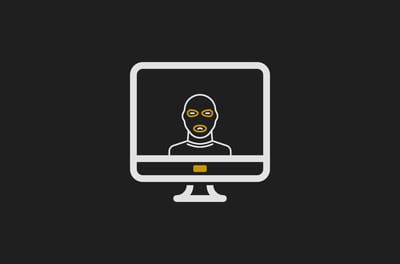Table Of Contents
- The Legitimacy of Regulated FOREX Markets
- Common Types of FOREX Scams
- Warning Signs of a FOREX Scam
- How to Identify Legitimate Brokers vs. Fraudulent Companies
- How fraudulent brokers target victims
- Key Questions to Ask Before Dealing with a Broker
- What to Do if You’ve Been Scammed
- Conclusion: How to Trade Safely and Protect Your Money
Is FOREX Trading Legit? How to Trade Safely and Avoid Common Scams
I hadn't been trading long when I learned that the FOREX market is the largest financial market in the world. As one of its number, I contributed to a thriving and energetic marketplace of FOREX traders and institutions globally who collectively trade trillions of dollars daily. Unfortunately, I soon found out that with so much wealth changing hands, unscrupulous criminals and scammers lurk in the shadows of the market, looking to make a buck off inexperienced traders.
There are many types of FOREX scams. I'll talk about these later in this article. It is important to note that scams are not only perpetuated by criminal elements but also by some online FOREX brokers who are supposed to create a safe and enabling environment for traders to prosper. The FOREX world has allowed many traders to enrich themselves through FOREX trading, but it also provides a haven for dishonest players to craft schemes and plans to prey on investors.
Online brokers are sometimes the biggest culprits in this area. Today, it is easy to set up an online brokerage with headquarters in a distant jurisdiction over which mainstream regulators have no control. In their excitement, some new FOREX traders neglect to perform the right amount of research, resulting in them falling into the hands of these illicit operators.
Although FOREX scams are harder to pull off today, it has not stopped criminal syndicates from trying. Granted, strong regulation has meant that many of the less sophisticated scams get weeded out, but smarter scams are still prevalent and are still catching people.
In this article, I will describe the most common scams and explain how to spot and avoid them.
FOREX trading is legitimate, but the market attracts scammers targeting inexperienced traders.
Always verify that your broker is regulated by a reputable Tier-1 authority.
Signal scams, fake bots, and pyramid schemes are common traps in the FOREX industry.
Manipulated spreads and slippage can erode profits if you use dishonest brokers.
Clone websites and fake platforms often mimic legitimate brokers to steal funds.
Watch out for aggressive sales tactics and potential earnings that are too good to be true.
Victims of scams should act quickly by reporting the issue and pursuing fund recovery options.
Staying informed, verifying credentials, and avoiding “get rich quick” promises are your best defences.

The Legitimacy of Regulated FOREX Markets
You could be forgiven for wondering if FOREX trading is legitimate if you are a total newbie, I know I did, initially. FOREX trading is exchanging one currency for another on an open market. The FOREX market operates 24 hours a day and five days a week. Brokerage firms play a key role in this marketplace by enabling clients to buy and sell through a trading platform.
FOREX trading is an integral part of international trade between nations and, by extension, retail FOREX traders, who speculate on the movement of different currencies in the retail FOREX trading market. So, is FOREX trading legit? If you have heard the term mentioned now and again and wondered about its legitimacy, FOREX trading is definitely legit.
It is a legal activity in many countries, and the proceeds are taxable. Retail FOREX trading takes place on a market designed to allow traders to buy and sell foreign currencies for a profit. A central authority does not regulate this Over-the-Counter (OTC) market. It does not belong to a single formal exchange, despite appearing that way when people talk of a single “market.”
In reality, currencies are bought and sold through banks and other intermediaries. The internet is the backbone of modern trading, and payments can be made instantaneously across locations to keep the market functioning liquid. FOREX traders need to master the industry to thrive. This means knowing the language and the mechanisms that underpin it. Investors need to understand how macroeconomic factors, like a country's inflation rate, interest rates, economic and political stability, and national debt, impact its exchange rate.
Common Types of FOREX Scams
I'm glad to say that many once-common scams have fallen away due to tighter regulations and better broker platform technology, but some still prevail. As I have suggested, scammers can be divided into two camps – external criminals and unethical FOREX brokers.
That said, here are some examples of the most common FOREX scams:
Signal scams
One increasingly prevalent scam is that of the signal seller. Signals are data-driven broker-generated information prompts that improve traders' opportunities to make profitable trades. They can be used for trading assets, such as FOREX, crypto, stocks, and commodities. They are invaluable for many traders, and a great signal product can set many brokers apart. However, some unscrupulous brokerage firms or analysis companies charge a fee to provide positive recommendations that will allow you to make exceptional returns. Of course, this is a lie, as no company or person can guarantee trading success.
Many signal sellers tap into our emotional tendency to want to get rich fast and with little effort. These firms work with traders for a limited time, returning on their promises after taking their fees. Truth be told, these unethical operators are in the minority, and many companies that sell signals do so ethically, honestly, and professionally.
Robot scams and automated system fraud
A recurring modern-day scam involves brokerage firms promising to program automated trades that allow you to earn money while not actively trading on your computer. The term “robot” refers to automating the process with software, otherwise known as a trading bot. The problem is that these systems are often not tested and proven. Traders usually lose money.
It is always good advice to check with these brokers as to how their algorithms work. Sometimes, if the information is complex enough, even a detailed explanation may not give you the answers you seek. All the same, you must try. If you ask pointed questions about the workings of their algorithms, the broker may offer vague responses and claim the information is confidential. If you cannot grasp at a high level how the robot trader works on your behalf, then it is probably not a good investment.
Multi-level marketing (MLM) and pyramid schemes
Multi-level marketing (MLM) companies are designed to use direct sales methods to sell products and services. These legally registered companies use a playbook that involves recruiting a sales staff and incentivizing them to sell their offerings to other individuals and bring on recruits. Sales staff are paid a percentage of their recruits' sales.
Many firms concentrate on FOREX trading as a product for sale. In some cases, in the FOREX world, FOREX MLMs require members to pay a monthly fee in exchange for daily signals and technical advice.
Where is the scam? Well, with this scheme, the emphasis is not as much on FOREX trading as it is on recruiting new members. These companies drive new sales as the end goal, without paying nearly as much attention to the success of the members they recruit. FOREX traders would rather self-educate or use the curated communities offered by their chosen brokerages than use FOREX MLMs.
FOREX pyramid schemes are designed to attract new members into investment communities that promise advice and technical assistance on how to help turn people into successful FOREX traders.
They operate in the same way as FOREX MLMs, but are run by individuals. These schemes are not to be confused with social-trading communities created by online brokerages, or even MLM schemes, but rather, they are private circles run by individuals who seek to profit by charging a subscription fee and encouraging new members to recruit fellow investors for the prize of a small commission payout.
In some pyramid schemes, membership fees create wealth for the organizers, rather than actual profits from FOREX trading. This scam is known as a pyramid scheme because the larger the community grows, the higher the money-earning pyramid older members climb. You might wonder what is wrong with an organization such as this if members can share advice and earn money. The truth is that all pyramid schemes have a natural end state, where no more members can be recruited, at which time the leaders close the scheme and take what money is still available.
The point-spread scam
This scam has been promoted by dishonest brokerage firms who manipulate the bid-and-ask spreads on their platforms for their benefit. As brokers earn their commissions from the size of the gap between bid and ask prices, they make more money when the gap is bigger. If the market has not created such a situation as it responds to the forces of supply and demand, some brokers have been known to open the gap by rigging the prices' coding. This practice is difficult for traders to uncover in such a fast-moving market.
If questioned, the broker could claim that their spreads are wider because the bank they are dealing with cannot offer a better price. They could cite other reasons related to internal processes and pricing. The fact would remain that traders would have to pay an unnecessarily high spread. This is why traders should verify with other brokers and see what spreads they offer for the currency pair.
Slippage is a change in a currency pair's bid and ask rates between the time a trade is opened and executed. It could happen because of a network glitch that slows trade execution, or it could be a function of currency risk to which a trader is exposed in a volatile FOREX market.
To avoid this, some brokers offer guaranteed stop-loss orders that a trader can buy to hedge against the risk of slippage. Responsible brokers that provide this fail-safe are unlikely to be dishonest with their spreads. You can keep yourself informed by reading user reviews about brokers you want to deal with, and users may complain about the manipulation of prices. If you habitually read reviews, you will be much better off.
This point-spread scam has settled down over the years as regulators are wise to it. EU regulations passed by the Markets in Financial Instruments Directive (MiFID) seek to stamp out practices like these by enforcing stricter reporting by brokers. The lesson for traders is that they should only work with regulated brokers who would find it impossible to run such scams due to proper oversight.
Fake FOREX funds and mutual fund scams
FOREX funds are an increasingly common product offered by financial service firms. They are designed to mirror index or mutual funds, except that the clue is that they often come with an unrealistic promise of extravagant returns. The truth is that these firms cannot make these commitments as the FOREX market is so much more volatile and unpredictable than stable markets like index or mutual funds.
These financial firms offer managed FOREX accounts, where an “expert” FOREX trader invests currency on your behalf. You usually have to pay a handsome fee for this service. You will not be surprised to learn that fraudulent firms often use this method to steal your money instead. It is vital to research any financial service or platform before investing.
Extravagant leverage traps
Leverage is an excellent tool for traders and is highly useful in FOREX trading. However, it is a dangerous method if not used correctly because you can earn big profits but lose money just as quickly. Some brokers can give you leverage as high as 2000:1. While not technically a scam, this practice displays a level of professional carelessness that amounts to leaving you to the mercy of the market.
Dodgy bonuses and promotions
Brokers around the world commonly offer bonuses and promotions. Most European regulators have banned this practice as it can be abused. Even those regulators who allow promotions will tell the broker not to entrap or “lock in” the trader with their offer. However, this does not stop dishonest brokers from offering bonuses that are not attainable, and that can cause the trader to spend valuable time and energy pursuing them.
Misuse of personal data
Under the rules of Know Your Customer (KYC) legislation, every trader must supply private and confidential information, often banking and credit card information. Scam brokers may not protect your information as they are required to, and sometimes, they could even sell it to a third party, who may try to lure you into another scheme.
Clone websites and fake trading platforms
I ran into one of these scams in my early trading days. Luckily, I was alert to the telltale signs and didn't fall victim to the scam. As the criminal world keeps up with technological advances, it is easier for them to create replica websites that look very similar to legitimate broker websites. These malicious actors lure unsuspecting traders with promises of unrealistic returns, but the trader soon discovers that the website does not perform as expected. By then, they have had an account and deposited funds, which they will likely never see again.
Broker-led scams and fake trading promoters
In some instances, the broker is simply corrupt. In the Internet age, it is easy to set up an online brokerage that provides traders with access to a trading platform to buy and sell currencies. A broker can white-label much of their infrastructure and use third-party tools to create a façade that seems legitimate. Sadly, not all brokers are honest, and many will find ways to manipulate spreads, inundate you with fees, and generally profit from your patronage.
Further, if a broker is not regulated, they are not accountable to any governing body. If they go bust, you do not have any hope of recourse. In recent years, the number of brokers worldwide who have gone insolvent when their illicit practices catch up with them has steadily risen. That's why it's always a good idea to trade with the best-regulated FOREX brokers.
Warning Signs of a FOREX Scam
In my experience, the best starting point with any due diligence is to ensure your broker is regulated by tier-1 regulators such as the UK's Financial Conduct Authority or the Cyprus Securities and Exchange Commission. Regulated brokers must, among other things, keep very clean and compliant records and keep their operating funds separate from trader funds. Regulators can also randomly check in on a broker’s operations.
The most stringent regulators also ensure that brokers do not make unsubstantiated claims. In such a competitive, unregulated industry, it is common for brokers to run catchy marketing campaigns that misrepresent the truth and mislead investors. Besides these front-line checks that you must carry out yourself, here are some other warning signs to guard against
Aggressive or high-pressure sales tactics
I will say that most brokers operate professionally and conduct themselves as a company wanting to stay in business and protect their clients. This means you will never find a serious broker using overly aggressive tactics that put you under pressure to invest. Beware of anyone who pressures you by claiming there is a time limit on their offer and you need to take advantage of it right now.
Lack of proof, unclear background information
When scammers are working to attract new investors, they often show images of charts that demonstrate regular profits over a long period. Some FOREX scammers have been known to show charts from demo trading accounts that aren’t based on real trading.
It is, therefore, essential not to base your decision to engage with a partner on information that is difficult to interrogate. Be sure to ask for background information and fully disclose the calculations behind profits and losses. It is likely a FOREX scam if they cannot justify their claims, say it is too difficult to explain, or even take excessively long to provide the proof you need.
FOREX scams by fake trading promoters
There is a current push for foreign exchange investment and trading by numerous fake investment funds, which begin contacting victims through marketing emails or fraudulent sales representatives who can convince you to send money and sit back and enjoy the profits.
Unrealistic promises of guaranteed returns
Responsible brokers will remind you time and again of the risks of trading. If you are promised high returns as elusive as the “holy grail,” your broker is not honest with you. Anyone in the business knows there is no such thing as a guaranteed return, let alone consistently high returns. Profits are hard-won, and experience is gained through as many losses as wins.
High spreads disguised as low-fee trading
As a FOREX trader, you will know that spreads are the measurement of the difference in value between two currencies. If you take the USD/EUR as an example, a typical spread in pip terms would be two to three pips. If a broker approaches you with significantly wider spreads than the rest of the market, it is a warning sign of a company trying to take you for a ride. For more information about pips in trading, go here.
Excessive use of industry jargon to confuse
A classic trick of scammers is to distract you with industry jargon. The investment industry already has more than enough acronyms! If a company is unwilling to spend time explaining and breaking down complex concepts to you, you cannot expect them to be on your side.
Complicated or unfair withdrawal restrictions
Withdrawing your earnings is one of the most exciting parts of trading. If you encounter restrictions when withdrawing your funds, it may indicate your broker is trying to balance its cash flow with your funds, which is not permitted under the rules of any respected regulator and is a clear warning signal.
Untraceable brokers and blocked firms
In today’s world, it is easy enough to check the validity of any registration your broker claims to have. For example, most brokers proudly display the registration number assigned to them by a regulator. You can easily check it on the regulator’s website. If a broker cannot provide this, or if you perform the check and produce nothing, you have every reason to be concerned.
Misleading social media campaigns
More criminals are using social media to advertise fraudulent and non-existent investment opportunities. Their imagery is often highly compelling, with eye-catching luxury sets superimposed over a call to action to join the movement of newly wealthy FOREX investors. It sounds like an easy FOREX scam to spot, but so many people fall prey to such campaigns, only to be led to financial ruin.
How to Identify Legitimate Brokers vs. Fraudulent Companies
Signs of unlicensed companies
They do not have a registration number on their website, and this number also cannot be found on the websites of their central banks or regulatory authorities.
These companies provide accounting services to their clients.
These companies do their best to prevent withdrawals and encourage customers to deposit funds.
They operate through non-banking financial companies.
Profits come from customer deposits.
Their location and headquarters are unknown.
Characteristics of regulated, trustworthy brokers
These companies have a registration number on their website. You can check by browsing through known regulatory bodies such as the American, British, Australian, and others.
Licensed companies do not make any recommendations, provide accounting services, or predict market events.
They do not interfere with withdrawal and deposit operations.
They have accounts with reputable and credible banks.
Profit is made through commissions on new trades.
These companies have branches in countries such as London, Hong Kong, Dubai, and others.
How fraudulent brokers target victims
Many fraudulent FOREX companies follow specific methods to attract traders and open accounts through them, using several fraudulent methods, such as:
Making phone calls to traders
This is one of the most common methods in the world of fraud, and is used by most fraudulent trading companies. If you suspect that the person contacting you on the phone is affiliated with a dishonest company, all you have to do is hang up immediately.
Some fraudulent companies use email as a means of attracting traders. These companies send text messages via email, encouraging them to invest and trade with them, thus making more profits quickly. Some may be deceived by this and agree to deal with them, but you must first research the company's history and licenses before starting trading.
Online Investment Schemes
The internet provides fraudulent companies with more opportunities to defraud traders. They use the internet as a platform to hide their identity and then start promoting their fraudulent schemes. They also advertise on social media to reach the most significant number of victims. It is easy to differentiate between licensed and unlicensed companies' advertisements. The advertisements of licensed companies clearly show fraud. They try to attract and sell the dream of getting rich quickly, without the need for experience, or they use the method of explaining to people who have passed through them and made profits. On the other hand, licensed companies are restricted even in advertising and must disclose all financial risks.
If you enter a fraudulent trading company, avoid increasing the amount. It is easy to confirm that you are dealing improperly after entering a fraudulent company, as you will notice that an account manager contacts you from the company daily, as if he has no job except for you. Any employee who contacts you from the trading company and tries to help you with trading indicates that you are in a fraudulent place, as licensed trading companies are prohibited from providing any service related to the market, just like a bank. You can withdraw and deposit, but the bank employee will never tell you where to spend your money.
Recommended Brokers
Key Questions to Ask Before Dealing with a Broker
Are they regulated and by whom?
Like I did early on, you should find out if the broker is regulated and by whom. Not all regulators are created equally. You should always favour brokers regulated by Tier-1 bodies.
There are three tiers of regulation. Tier-1 bodies include the likes of the UK’s FCA and have excellent reputations from a track record of strong oversight assisted by sweeping powers. Tier-2 bodies include organizations from slightly less-developed markets or organizations that serve multiple roles, such as central banking, licensing, and regulation, thus diluting their power. Tier-3 bodies usually come from developing economies, like the Seychelles, that are attractive to brokers for tax purposes but do not observe stringent standards.
Do they promise unrealistic profits?
As I have mentioned, nobody can guarantee profits, not even the latest algorithms generated by supercomputers. The FOREX market and, indeed, all other free markets are driven by a range of factors that are well understood but are much harder to predict.
Are there questionable incentives like cash rewards for account opening?
It should be evident that if a broker is trying to attract you by all means, including offering cash rewards to open an account, they are trying to lure you in at all costs. The reason for doing this is hardly ever a good one.
Can their claimed awards or credentials be authenticated?
Brokers proudly tout awards, such as “Best FOREX broker of the year.” This is simple enough to check and verify through the issuing authority. If you cannot confirm a claim of award, it speaks volumes. Only dishonest companies and individuals would claim to be the recipients of a prize they are not. For the record, here is our list of the best brokers around.
What to Do if You’ve Been Scammed
Steps to report the scam
It may already be too late, but you can still save yourself from severe financial loss if you follow a few basic steps if you believe you have been scammed. The first thing to do is to draw your funds from the broker involved. This may not be possible for obvious reasons, as the broker could confuse you with rules you do not know, delaying the process.
If you cannot withdraw your funds after complying with the broker’s rules, it is time to ring the alarm bell. You should try to get an audience with a senior staff member at the broker. Again, you may be frustrated in your attempts to do so, meaning you must take your complaint further.
The next possible step is to identify the industry representative body to which the broker belongs. The financial industry is known to have so-called charter organizations that represent the interests of its members. Depending on your broker's location, you could approach the controlling body representing all brokers.
Next, you can take your grievance to the regulator. Remember, you need to check if your broker is regulated, as they may have left you with nowhere to go if they are not. Finally, you can pursue legal action. However, this is costly and could drag on for years to no avail.
Recovery possibilities (realistic expectations)
If you are a victim of fraud or scams with any company you have opened a trading account with, you must first have evidence of the fraud that occurred with your money.
Some proven ways may help you recover your money from these companies, which are as follows:
Credit cards: If you deposited your funds using a Visa or MasterCard, you can easily recover your stolen funds. All you have to do is contact the bank that issued the card and report the fraud. The bank will then contact you and coordinate to recover your funds, provided the deposit period does not exceed 60 days.
With the widespread use of credit cards worldwide, regulators have approved the cancellation of credit card transactions if a transaction is stopped. This law allowed customers to cancel transactions at any time if the deposit period did not exceed 60 days.
However, it is crucial not to sign the deposit slip to authenticate the deposits.
Credit cards have a chargeback feature that allows you to return the amount you want if you discover fraudulent activity on your account.
Bank Transfers: If you deposit via bank transfer, it is difficult to get a refund.
Conclusion: How to Trade Safely and Protect Your Money
In my view, FOREX scams are constantly evolving, and even though regulators have tried to stamp them out, they are still out there. You need to be alert to avoid becoming a victim. You must exercise great caution when dealing with brokers, especially those who operate in unregulated spaces and those offering deals that are too good to be true. If you follow the advice I've given you in this article, you will vastly reduce your chances of becoming the victim of a FOREX scam.
FAQ
No, FOREX trading is a legitimate global financial market where currencies are exchanged. It operates 24 hours a day, five days a week, facilitating both institutional and retail trading. However, scams exist within the industry, often targeting inexperienced traders.
Always check if the broker is regulated by a Tier-1 authority like the UK's FCA or Australia's ASIC. Reputable brokers provide registration numbers, operate transparent withdrawal processes, and do not make unrealistic profit guarantees.
Key scams include signal seller fraud, fake automated trading bots, pyramid schemes, inflated bid-ask spreads, fake FOREX funds, excessive leverage offers, misleading promotions, misuse of personal data, and clone websites posing as legitimate brokers.
Dishonest brokers may manipulate spreads or execution speeds to their advantage, often widening spreads artificially or causing slippage. Choosing a regulated broker and reading trader reviews can help reduce this risk.
Fake platforms often look convincing but lack verifiable regulatory details. If the broker cannot prove its registration or offers guaranteed profits, it’s likely a scam. Always verify company claims through official regulatory websites.
Immediately attempt to withdraw your funds. If that fails, report the issue to the broker’s regulatory body, industry associations, and your bank. Credit card deposits may be reversible within 60 days, but bank transfers are harder to recover.
Work only with regulated brokers, verify credentials, avoid unrealistic promises, question aggressive sales tactics, and research company backgrounds thoroughly. Never let marketing hype or social media campaigns cloud your judgment.






